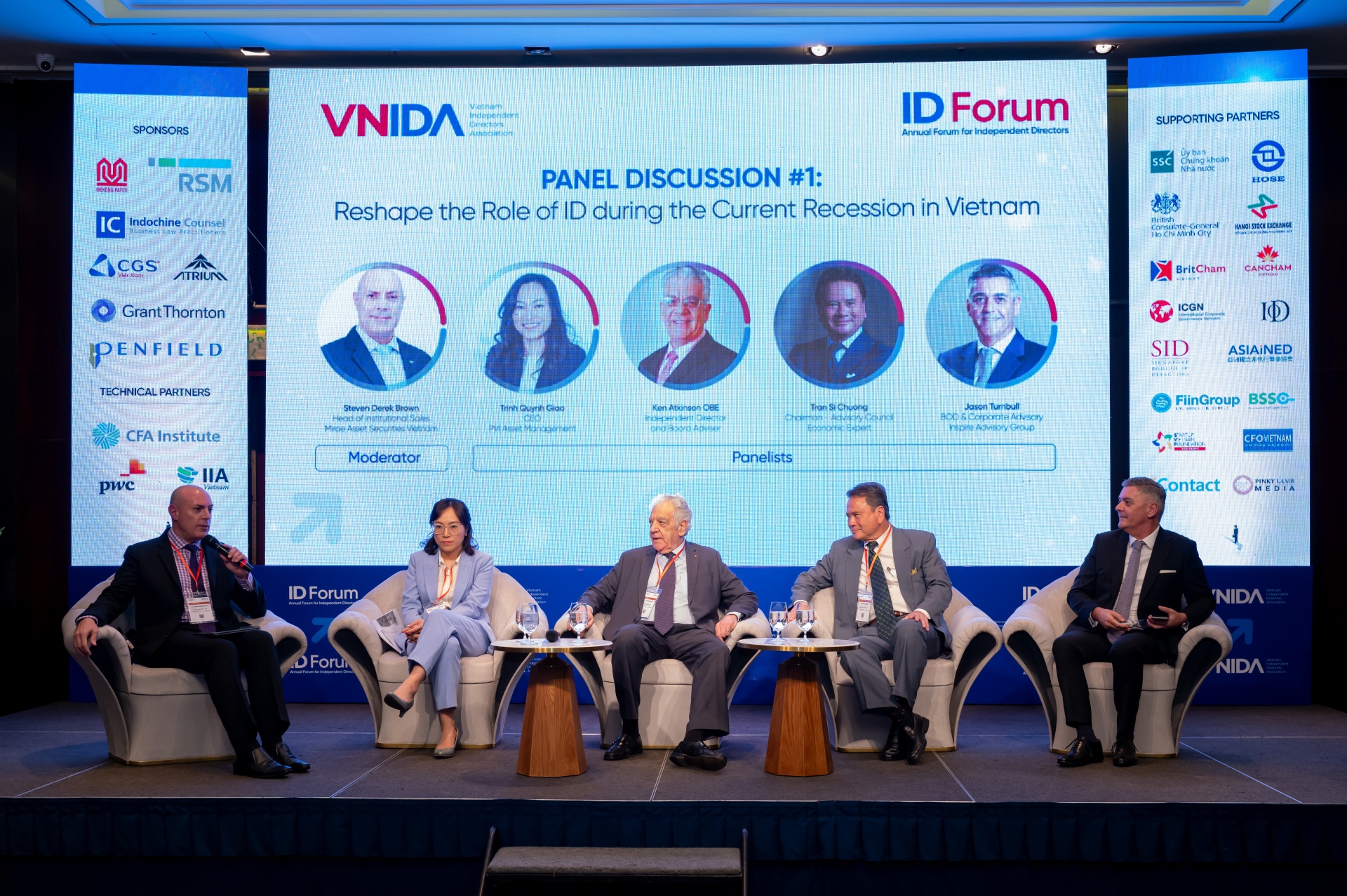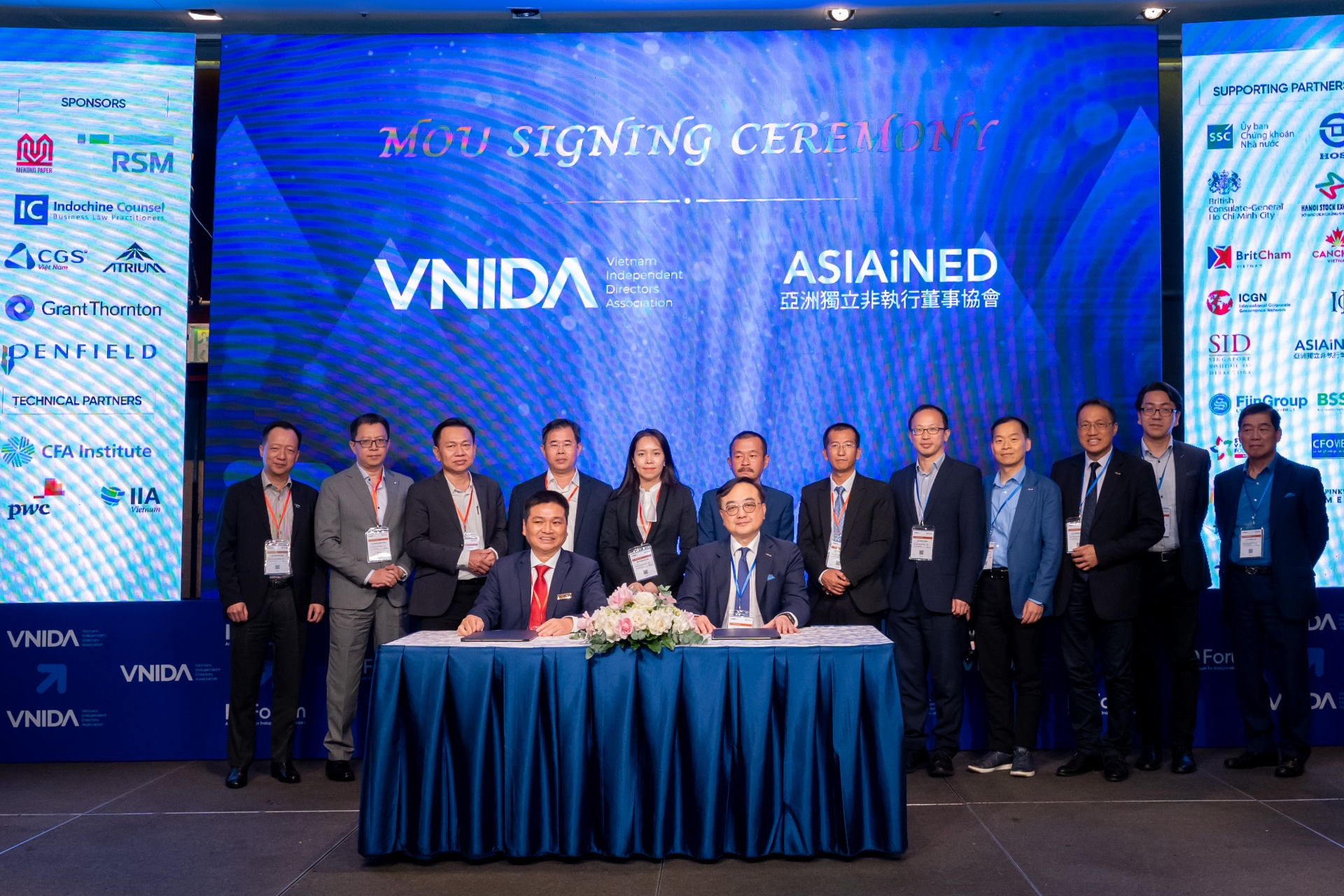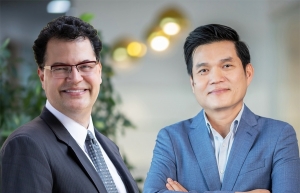VNIDA conference debates future of independent directors in Vietnam
 |
With a focus on the future of independent directorship, the forum fostered in-depth discussions and offered a platform for sharing valuable experiences. By spotlighting the pivotal role of independent directors, the forum emphasised the importance of integrity, professionalisation, and continual learning, with calls for a robust approach to navigate the multifaceted terrain of corporate governance.
Defining authentic independence
Ken Atkinson OBE, independent director and board adviser of the VNIDA, set the stage by voicing concerns that are being increasingly raised by foreign investors scouting the Vietnamese market. "These investors," Atkinson explained, "are meticulously evaluating the corporate governance of potential investments, with special attention to the genuineness of board independence."
While posing a question about Vietnam's business environment, a landscape rich with family enterprises, Atkinson said, "Who truly are these alleged independent directors? Could these roles be filled by family members or close allies, thereby undermining the essence of true independence?"
In the same vein, Jason Turnbull, a member of the Corporate Advisory Board and managing director of Inspire Advisory Group, emphasised the significance of trustworthiness in corporate governance. "An individual entrusted to keep a company's secrets, and who values honesty above all else, is far more valuable than one who solely relies on skills, knowledge, or networks," said Turnbull.
"In Vietnam, the criteria for independent directors takes on even greater subtlety, where the ideal candidate is not only a law-abiding individual but also one who demonstrates meticulous attention to detail," he added.
Likewise, Tran Si Chuong, chairman of the Advisory Council at the VNIDA and a renowned economic expert, believed that at the heart of this process lies integrity.
“Trusting an individual with the company's confidential information demands a rock-solid foundation of honesty. Meanwhile, skills and professional networks, while significant, are considered secondary,” Chuong said. “Additionally, independent directors should be chosen for their respect for legal norms, ensuring the company's compliance with regulatory standards. In addition, a keen eye for detail aids responsible and effective leadership,” he said.
Chuong also highlighted the importance of the role of the independent directors, saying, "When you sit as an independent director, the legal responsibility is immense, and it truly is a serious job, not just for show. It requires effort and time to understand the job and the company rigorously."
Meanwhile, Trinh Quynh Giao, CEO of PVI Asset Management, discussed the rising trend of environmental, social, and governance (ESG) practices, highlighting its cost implications. Giao noted that despite its global significance, many companies are still assessing whether ESG commitments are opportunities or risks.
“In the quest for genuine sustainability, businesses must distinguish between real growth strategies and trend-chasing. Understanding a company's expectations and strategic vision is crucial in identifying suitable sustainability measures,” she said.
Giao also suggested that aligning the goals of the independent director and the company, alongside effective ESG cost management, can drive significant, sustainable growth. This balance requires strategic thought and planning, paving the way for successful navigation through ESG challenges.
In an economic landscape that is continually evolving, Vietnam's Securities Law, marking its 17th anniversary, plays a pivotal role in shaping the country's corporate culture.
"Despite the decade-long journey, the position and importance of independent directors in Vietnamese firms - both listed and unlisted - remains somewhat obscure," said Hoang Hai Anh, independent director at Rong Viet Securities Company, and also vice president of the VNIDA.
“Most industry participants are cognizant of the critical role of independent directors. However, within listed and unlisted companies alike, the roles of these board members are not fully clarified, leaving room for confusion and inefficiency,” Anh added.
Envisioning the future of independent directorship
 |
Having spent numerous years in both the public and private sectors, Do Le Hung, independent director and chairman of the Audit Committee at Vinamilk, offered unique insights into the role of independent directors. Vinamilk was one of the first companies in Vietnam to adopt the independent director model, a novelty in the corporate landscape at the time.
"With a solid understanding of corporate governance methodology, the role of an independent director can be effectively carried out across different companies," Hung said, "Independent directors should focus on areas like internal audit monitoring, legal adherence, risk management, and personnel issues."
Hung went on to say maintaining independence when interacting with the board is a key challenge, advocating persuasion over direct voting in the case of shareholder disagreements, emphasising that shareholders and chairpersons guide the company's direction.
Furthermore, Hung proposed that the VNDIA develop independent directorship as a profession, similar to independent audit firms. He cited the Big Four accounting firms (KPMG, PwC, EY and Deloitte) as an example, questioning why there shouldn't be a professional organisation providing independent director services.
"If there's an organisation providing such services, listed companies would benefit from the professional, quality assured services of independent directors. These directors would also have a solid base, giving them more confidence in their career paths," Hung said, believing this would benefit listed companies by ensuring professional, quality-assured services.
Lastly, he advised aspiring independent directors not to view board membership as a job, but as a professional service provision. "Maintaining one's professional independence is essential to becoming a valuable board member," said Hung.
From global perspectives to local experiences - enriching the dialogue on independent directorship
 |
In a broader context, Sivananth Ramachandran, director of Research and Advocacy (Asia Pacific), CFA Institute, said that to enhance corporate governance practices in Asian markets, he would make several vital recommendations.
“Firstly, companies should increase the proportion of independent directors on their boards to ensure effective oversight and decision-making. Encouraging engagement with shareholders can foster better communication and understanding of investor concerns. Lastly, comprehensive training programmes for independent directors are necessary to equip them with the knowledge and skills to navigate related party transactions and complex corporate structures effectively,” he stated.
Meanwhile, Prof. Mak Yuen Teen, mentor – Advisory Council of the VNDIA, and professor of National University of Singapore, shared an example of independent directors in Singapore.
Singapore adopted the concept of independent directors in 2000, undergoing several revisions since, emphasising independence from management, business relations, and major shareholders. In the current framework, if the chairman is not independent, the board's majority must be independent directors. Despite these reforms, concerns persist regarding directors' true independence.
"Ideal independent directors should have profound industry knowledge, commitment, and backgrounds in areas like startups, sustainability, and digital transformation," said Prof. Mak.
A significant highlight of the conference was the official launch and signing ceremony marking a strategic partnership between the VNIDA and the Asian Association of Independent Non-executive Directors (ASIAiNED).
ASIAiNED will facilitate the transfer of international knowledge and expertise in independent directorship to VNIDA.
 | Navigating challenges and embracing succession: Insights for Vietnamese family businesses Vietnam’s family businesses should prioritise the paramount importance of a well-crafted succession plan to secure their long-term success and effectively pass on leadership to future generations. |
 | Forging a strong data foundation in Vietnam Industry experts and executives joined forces at a recent conference to delve into the transformative power of data in driving business transformation. These experts also shed light on the critical importance of this endeavour, particularly in relation to Chief Financial Officers (CFOs) and their pivotal role in the process. |
 | Navigating a stricter data privacy legal landscape As the first comprehensive personal data protection legal framework in Vietnam is about to become effective, businesses are scrambling to comply. Michael Beckman, partner at EY Law Vietnam, and Robert Tran, partner at EY Vietnam Cybersecurity Services, discover the impact of the regulations on the financial sector and what to do to build a culture of personal data privacy. |
What the stars mean:
★ Poor ★ ★ Promising ★★★ Good ★★★★ Very good ★★★★★ Exceptional
Related Contents
Latest News
More News
- Fruit and vegetable exports surge ahead of Lunar New Year (January 21, 2026 | 10:00)
- Kafi Securities' double APEA honours reflective of strong 2025 (January 20, 2026 | 15:44)
- GE HealthCare showcases latest imaging innovations in Vietnam (January 19, 2026 | 11:56)
- BIM and ISO 19650 seen as key to improving project efficiency (January 17, 2026 | 10:45)
- US-Vietnam partnership targets tilapia development and soy-based aquafeed trade (January 16, 2026 | 16:50)
- Vietnam, UN strengthen cooperation in digital technology, AI (January 16, 2026 | 16:48)
- Shopee and TikTok Shop account for 8 per cent of Vietnam’s retail market (January 16, 2026 | 00:00)
- Sanofi, Long Chau Pharmacy relaunch medicine blister pack collection initiative (January 15, 2026 | 15:35)
- Viet Industry 2026 exhibition scheduled for September (January 09, 2026 | 09:51)
- Cathay kicks off ‘80 Years Together’ anniversary celebrations (January 08, 2026 | 11:05)

 Tag:
Tag:















 Mobile Version
Mobile Version